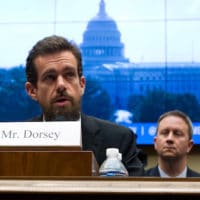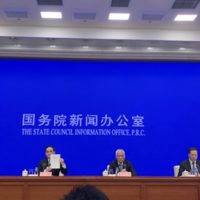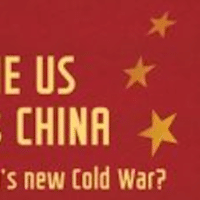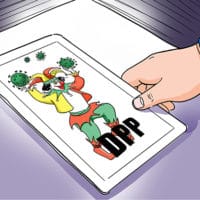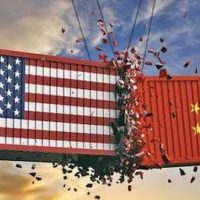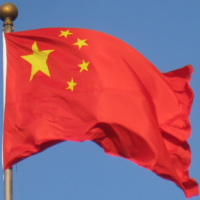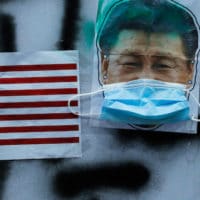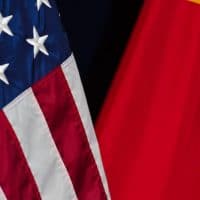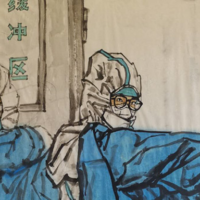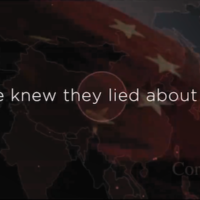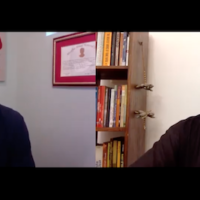-
Canada’s membership in the Five Eyes alliance promoting conflict with China
It is time Canadians debate whether they want to be part of an intelligence group driving hostile relations with China.
-
Fear, lack of confidence push U.S. to restrict Chinese media
More concerns raised over bleak outlook for China-U.S. ties: observer
-
Debunking Trump and Corporate Media’s WHO/China coverup conspiracy theories
The Trump administration suspended funding to WHO in April—the UN’s primary infectious disease–fighting body—accusing it of “severely mismanaging and covering up the spread of the coronavirus,” and of taking China’s allegedly deceptive claims about its handling of COVID-19 at “face value.” But corporate media had already been boosting these same talking points.
-
Who deserves the Nobel Peace Prize in a time of pandemic?
A few weeks ago, I was talking to Noam Chomsky about the state of the world. At one point, Noam smiled and said that he is not aware of any German doctors in Italy, even though both countries are in the European Union; instead, Cuban and Chinese doctors went to Italy to help the Italians fight the global pandemic.
-
Hawkish, Gov’t funded think tank behind Twitter decision to delete thousands of Chinese accounts
Twitter’s decision came after close collaboration with a deeply controversial U.S. and Australian government-funded think tank that has been denounced by Australia’s former ambassador in Beijing as “the architect of the China threat theory in Australia.”
-
China suspends debt repayment for 77 developing nations, regions
China has announced the suspension of debt repayment for 77 developing countries and regions as the nation is working with other G20 members to carry out the G20 debt relief initiative for low-income countries, Chinese officials said at a press briefing at the State Council Information Office on Sunday.
-
‘The U.S. vs China: Asia’s New Cold War?’ by Jude Woodward reviewed by Sean Ledwith
The coronavirus pandemic of 2020 has slammed into the global system with almost the same impact we might expect from an asteroid strike. All aspects of economic, cultural and political activity on the planet have been devastated and disrupted in ways that seemed unimaginable just a few months ago.
-
Taiwan and WHO in the COVID-19 pandemic
The ruling establishment’s intrigue against the WHO might seem at odds with Taiwan’s failed bid to join the World Health Assembly (WHA) this past May, but there was no contradiction between Taiwan being seen fighting a David and Goliath-like battle with both the WHO and China, thereby flaring up geopolitical tensions from without. Both served the interests of the ruling class of Taiwan.
-
Huawei ban drags China, U.S. into tech cold war
Industries prepare for decoupling as worst scenario, accelerating homegrown technologies as Washington hawks destroy global supply chain.
-
The power of propaganda: Americans think Trump’s COVID-19 performance better than China’s
Americans rate their own government’s response, along with that of the UK and Italy, higher than that of China despite those countries having much higher death and infection rates.
-
COVID-19 adds new dimensions to U.S.-China trade war
The Trump regime is ratcheting up its protectionist rhetoric vis-à-vis China. If this leads to new sanctions, it would worsen the COVID-induced trade crisis rather than help the U.S.
-
How to understand all this China stuff
The notion of “pre-crime” is the purview of dystopian horror fiction when applied to individual people, and there’s no reason we should find the prospect of attacking and destroying for hypothetical future offenses any less insane on an international scale.
-
American exceptionalism and the American Left’s China double standard
The threat that the American Left sees in China aligns with the white supremacist underpinnings of American exceptionalism.
-
U.S. Military planners advise expanded online psychological warfare against China
Just three years ago, Americans had a neutral view of China (and nine years ago it was strongly favorable). Today, the same polls show that 66 percent of Americans dislike the country.
-
The U.S. Military is hell-bent on trying to overpower China
The absence of a strong world peace movement with the capacity to prevent this buildup by the United States is of considerable concern for the planet. The need for such a movement could not be greater.
-
Russia-China entente deepens in the shadow of the pandemic
The Russian-Chinese entente emerged as one of the most significant templates of international politics in the recent period since the hugely consequential developments in Ukraine in 2014 that led to western sanctions against Moscow, which in turn galvanised the latter’s ‘pivot to Asia’.
-
Farewell to the god of plague
The Communists were determined to eradicate disease. In the 1930s, Mao joined the Chinese Communist Party’s Public Health Commission; in 1934, when he was in the Jiangxi Soviet, Mao placed public health at the top of the list for party work.
-
It is not just propaganda: What the U.S. anti-China campaign is looking for
The Trump Administration has spread the conspiracy theory that the new coronavirus came out of the Wuhan Institute of Virology. This accusation, which seeks to transfer responsibility for the pandemic to the Asian giant, has been rejected by the Chinese authorities for being without foundation.
-
Media fail to identify xenophobia as Biden says Trump ‘rolled over for Chinese’
Rather than respond by focusing blame for the crisis squarely where it belongs—on Trump’s incompetent, reckless and self-centered management—and working to beat back the dangerously rising anti-Asian sentiment in this country, Biden and some of his supporting super PACs are choosing to adopt rather than challenge the anti-China premise of the attacks.
-
Blaming China for the COVID-19 crisis is deceitful
Vijay Prashad talks about China’s response to the COVID-19 crisis, especially in the light of the accusations that are being leveled against the country


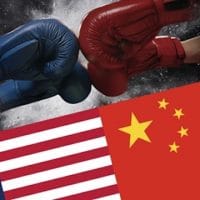
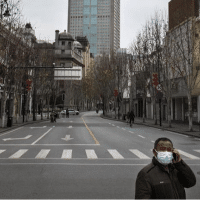
![Oslo City Hall - The place where the Nobel Peace Prize is presented Oslo City Hall (Norwegian: Oslo rådhus) houses the city council, city administration, and art studios and galleries. The construction started in 1931, but was paused by the outbreak of World War II, before the official inauguration in 1950. Its characteristic architecture, artworks and the Nobel Peace Prize ceremony, held on 10 December, makes it one of Oslo's most famous buildings. It was designed by Arnstein Arneberg and Magnus Poulsson. The roof of the eastern tower has a 49-bell carillon which plays every hour. It is situated in Pipervika in central downtown Oslo. The area was completely renovated and rebuilt to make room for the new city hall, back in the late 1920s. In June 2005 it was named Oslo's "Structure of the Century" [Wikipedia.org]](https://mronline.org/wp-content/uploads/2020/06/29879653935_b62010aaca_c-200x200.jpg)
